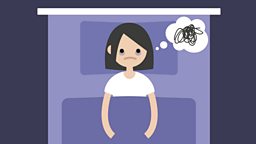Six ways to cope with anxiety
If you have anxiety, you’re not alone. We are experiencing what many are calling an anxiety epidemic: more than eight million people in the UK have an anxiety disorder of some kind, according to Cambridge University. Here, six women-in-the-know offer practical advice on dealing with anxiety…

Be kind to yourself
“I try to be kind to myself. I’ve started now to pat myself on the back for the smallest achievements.” Singer-songwriter, Laura MvulaSinger-songwriter, Laura Mvula
In our documentary, Laura Mvula: Generation Anxiety, the singer-songwriter opens up about her anxiety and panic attacks, not to mention her monophobia - fear of being alone. She talks about the importance of practising self-kindness, and documenting progress for the things that she finds difficult.

Challenge your fears
“One of the most galvanising things that I have learnt is our brains’ ability to change. And it’s so difficult to believe that when you’re in a moment of despair. But, over time, it’s learning that we can change the way you think. That thoughts are just thoughts. You can counteract your own thoughts.”Eleanor Morgan, trainee psychologist and author of Anxiety For Beginners: A Personal Investigation
Cognitive behavioural therapy (CBT) is a talking therapy that helps those with anxiety see how they can change the way they think and behave. It can be difficult for those with anxiety to do the opposite to what their brain is telling them. It takes a lot of practice, hard work and bravery for a person with anxiety to change the way they think, but it’s worth it.
Open up

“Well, the first thing really is to talk about it… openly, so that people aren’t afraid of mentioning it because the more fear, the worse their inner fear becomes.”Marjorie Wallace, CEO of mental health charity, Sane
Times are a-changin’, so sang Bob Dylan. The same can be said for talking about mental health problems and removing the stigma associated with doing so. If you’re feeling anxious, talk to someone you love, you trust. And if you can’t do that, try a helpline, such as Mind, Sane or the Samaritans. There are people who can listen and help you without judgement. You've probably heard this countless timeless before but talking about your worries will make you feel far better than bottling them up.

Get that serotonin pumping
“On a Sunday morning by 11:30, I’ve done a two-mile walk and I’ve met people, and you think, ‘I’ve really achieved something with my day.’”Bryony Gordon, journalist, author of Mad Girl and founder of Mental Health Mates
Yes, everyone tells you this. No, you might feel like eating all the cheese in the house in your pants, watching Masterchef instead. But, get off that sofa and move those limbs. Preferably in the fresh air. Whatever physical exercise floats your boat, do it. Choose something that doesn’t feel like a chore and you’ll be well-away and feeling a hell of lot better, both mentally and physically.

Limit screen time
“My phone goes on Airplane mode and lives outside the bedroom between 10p.m. and 7a.m., so that it doesn’t distract me from getting a good night’s rest. Twitter might be the social network that never sleeps, but I need to.”Daisy Buchanan, author of How To Be A Grown Up
It might sound obvious but simple self-care, such as getting enough shut-eye (alongside regular exercise and a healthy diet), is crucial to feeling on an even keel. If you’re sleep-deprived, you’re far more likely to be susceptible to feeling anxious. Our 24/7 screen society and apparent addiction to social media is not helping our frazzled minds. So, stop stalking your past lovers online, and switch off, literally, at least an hour before going to bed. Read a book. That's right, a beautiful book that you can hold in your hands, and you'll be dropping off in no time (not because it's a boring book, unless, of course, it is.)
And finally... practise mindfulness
Mindfulness can be a useful tool for people with anxiety. By being more aware of the thoughts that flow in and out of your mind, the world around you and paying attention to the smallest of details, such as how each segment of a satsuma tastes, can help improve our mental health. It can also help us to appreciate our lives and understand ourselves that bit better, too. The writer and comedian, Ruby Wax, who ended up getting a masters degree in Mindfulness-based Cognitive Behavioural Therapy from Oxford University, will help you get to grips with mindfulness in no time. Just watch the little video below...

Ruby Wax’s Guide to Mindfulness
Helping your mind become a calmer, more contented place.
You can watch Laura Mvula: Generation Anxiety on the BBC iPlayer. And follow @BBCWomansHour on Instagram and Twitter.




